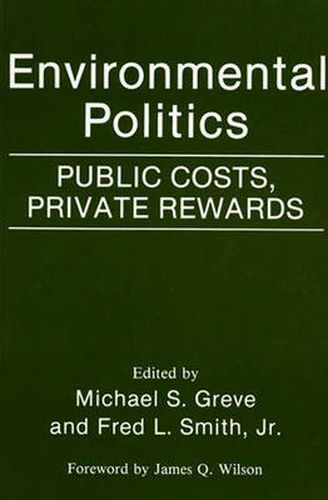Readings Newsletter
Become a Readings Member to make your shopping experience even easier.
Sign in or sign up for free!
You’re not far away from qualifying for FREE standard shipping within Australia
You’ve qualified for FREE standard shipping within Australia
The cart is loading…






The essays in this volume challenge the widespread belief that the government’s environmental policies, unlike those in other areas, are drafted and implemented to the public good and genuinely seek to effect a cleaner environment. The contributors demonstrate through seven important cases that there are strong reasons to reconsider the present command and control approach to environmental policy. They argue that policies and programmes are often designed to address political and economic objectives dear to power centers and interest groups. The authors seek to force a critique of present policies and programmes and to contribute to the making of an environmental policy more authentically in the public’s interest. To that end, the work analyzes the role of organized interests and political institutions in environmental policies, what their rationales may be, and what impact they have on the public welfare. The book provides specific case studies of clean air legislation, biotechnology regulation, Superfund, pollution deadlines, citizen suits, and international environmental regulation. The work constitutes a most timely, well-informed, and persuasive argument for more reliance on other sources than just central government to reduce risk and to enhance environmental well-being.
$9.00 standard shipping within Australia
FREE standard shipping within Australia for orders over $100.00
Express & International shipping calculated at checkout
The essays in this volume challenge the widespread belief that the government’s environmental policies, unlike those in other areas, are drafted and implemented to the public good and genuinely seek to effect a cleaner environment. The contributors demonstrate through seven important cases that there are strong reasons to reconsider the present command and control approach to environmental policy. They argue that policies and programmes are often designed to address political and economic objectives dear to power centers and interest groups. The authors seek to force a critique of present policies and programmes and to contribute to the making of an environmental policy more authentically in the public’s interest. To that end, the work analyzes the role of organized interests and political institutions in environmental policies, what their rationales may be, and what impact they have on the public welfare. The book provides specific case studies of clean air legislation, biotechnology regulation, Superfund, pollution deadlines, citizen suits, and international environmental regulation. The work constitutes a most timely, well-informed, and persuasive argument for more reliance on other sources than just central government to reduce risk and to enhance environmental well-being.